NovelAI: What is It and a Detailed Review [2023]
Updated May 29, 2024
Published September 23, 2023
![NovelAI: What is It and a Detailed Review [2023]](https://cdn.sanity.io/images/isy356iq/production/dbfdfdfce7eabc0a4af4148508cbc8871859779e-1200x800.jpg?h=260)
Our Verdict
Based on our review, we liked NovelAI’s customizable and powerful AI models in its Storytelling mode, which is an excellent tool for independent fiction writers and authors. Pro users can customize their writing style using AI modules inspired by famous poets and writers.
However, new users will need a steep learning curve, especially for customizing the AI models and using features in the Storytelling mode. The platform’s AI models heavily depend on well-written prompts to produce well-written content. Its free version is also very limited in features and limits, so users might need to subscribe to a paid plan to create a complete story.
Best For
Creative writers, novel authors, and fiction writers
Pricing
Free to $25/mo.
Free Version
Up to 100 free text generations
Pros
- User-friendly interface
- Robust and highly customizable AI models
- Robust Storyteller mode
- Users have ownership of created content
Cons
- Steep learning curve for new users
- Limited features on the freemium version
- Freemium TTS feature has low-quality audio
Ease Of Use
3.8
Value For Money
4.5
Features
4
Speed
4.7
What is NovelAI?
NovelAI is an interactive tool for AI-assisted storytelling. It offers various pre-trained AI models that help users to create unique and engaging fictional stories. Premium users have extensive access to different AI modules that can influence the generated text's theme or style and even train one using their data. The platform also offers other features like image generation and a text-to-speech tool.
Is NovelAI Right for You?
We recommend NovelAI if
- You’re an independent author with an interest in making fictional content.
- You prefer creating stories quickly and interactively using AI.
- You want access to powerful and customizable AI models for your story-writing tasks.
- You want an all-in-one storytelling platform that offers image generation and text-to-speech features.
NovelAI might not be suited for you if:
- You want more control over the story-making process, making it more unique.
- You want an AI storytelling platform that requires less AI model customization.
- You want an AI storytelling tool that requires less detailed prompts.
Pros & Cons of NovelAI
Pros
Robust and highly customizable AI models
NovelAI’s Storyteller Mode has three primary AI storytellers: Kayra, Clio, and Genji. They’re highly customizable according to how you want the AI to generate text.
Has pre-trained AI modules
Premium users will have access to various AI Modules that determine the theme or style of the AI-generated text. These modules can be inspired by famous poets like Edgar Allan Poe or specific themes like dark fantasy stories.
Robust storyteller mode
NovelAI’s Storyteller Mode is the platform’s main feature, which allows users to generate stories through robust AI models and add characters, events, or places using the Lorebook and other configurations.
Image generation and text-to-speech features availabl
Besides story-writing capabilities, the platform offers features for image generation and text-to-speech.
Users have ownership to the created content
Based on NovelAI Documentation, the platform does not claim copyright protections or ownership of any files, meaning that users own their generated stories, images, or audio content.
Cons
Steep learning curve for new users
In our experience, the platform doesn’t have a user-friendly interface due to its different configurations for customizing the AI model, leading to a steep learning curve for new users who didn’t have experience using any similar platforms to NovelAI.
Depends on well-written prompts to work effectively
Users need to create well-written prompts on its Storyteller Mode so the tool can generate their desired output text.
Limited features on the freemium version
Users on the Paper plan (freemium version) only offer up to 100 text generations and 6144 Tokens of Memory, which are minimal limits for users wanting to create a detailed story with various characters.
Low-quality audio on the freemium TTS tool
The platform’s freemium version of the Text-to-Speech tool only allows Local TTS access, leading to low-quality audio content.
What Sets NovelAI Apart
Unlike other AI-assisted storytelling tools like Dreamily and Holo AI, NovelAI has more robust and customizable AI models for its Storytelling mode. Users can use the Lorebook feature to set clear rules for the AI to remember, like characters and other key story details. The platform also lets users take ownership of their made content on NovelAI.
Key Features
As an AI-driven storytelling platform, here are some key features of NovelAI:
Storytelling Mode
NovelAI’s main feature is its Storytelling mode, which allows users to create a story based on fictional characters and worlds. It lets users utilize the platform’s pre-trained AI models, mainly Kayra, a “state-of-the-art model” by NovelAI trained from scratch. Users can also pick from various AI Modules, which influence the style of the AI-generated text:
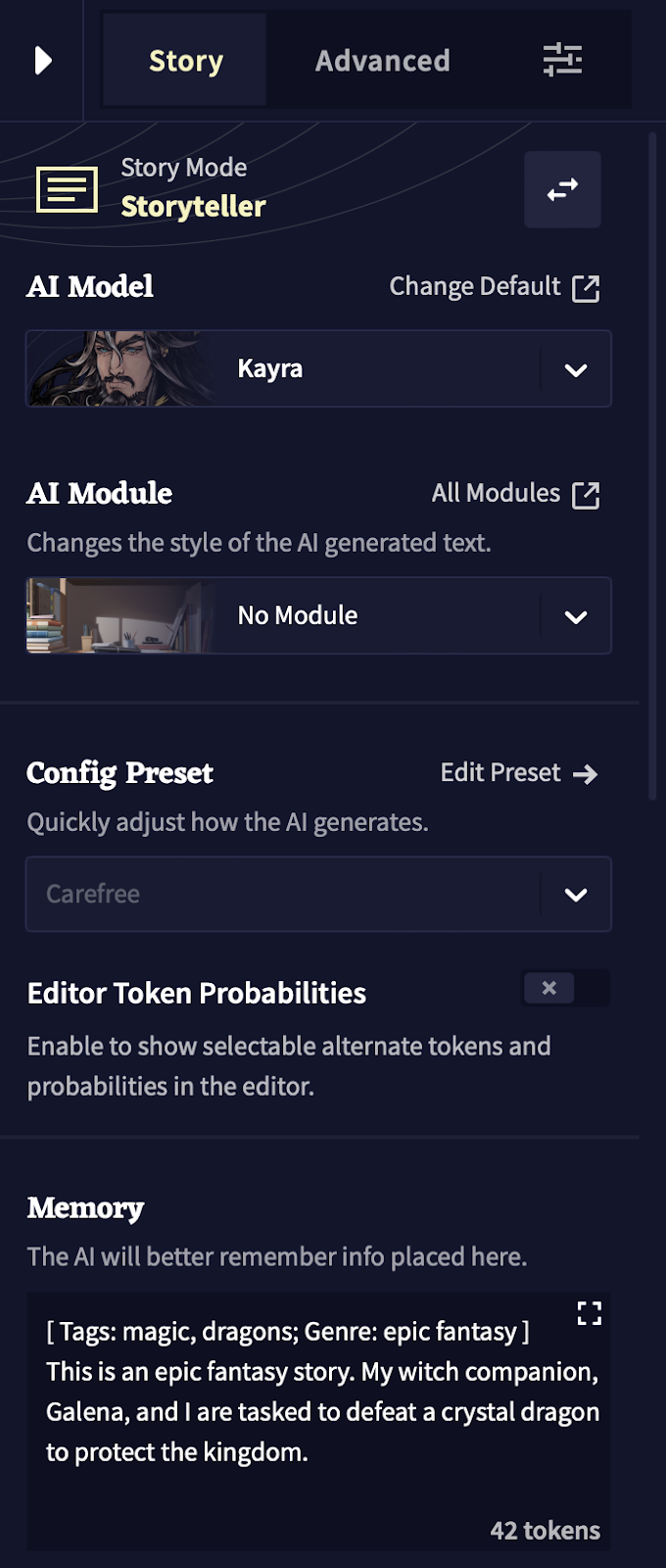
Users can also choose from various preset settings (Config Preset) to adjust how the AI model generates text and ideas.
Before creating your story, you can customize the characters, entities, and other entries that you want to include in the Lorebook:
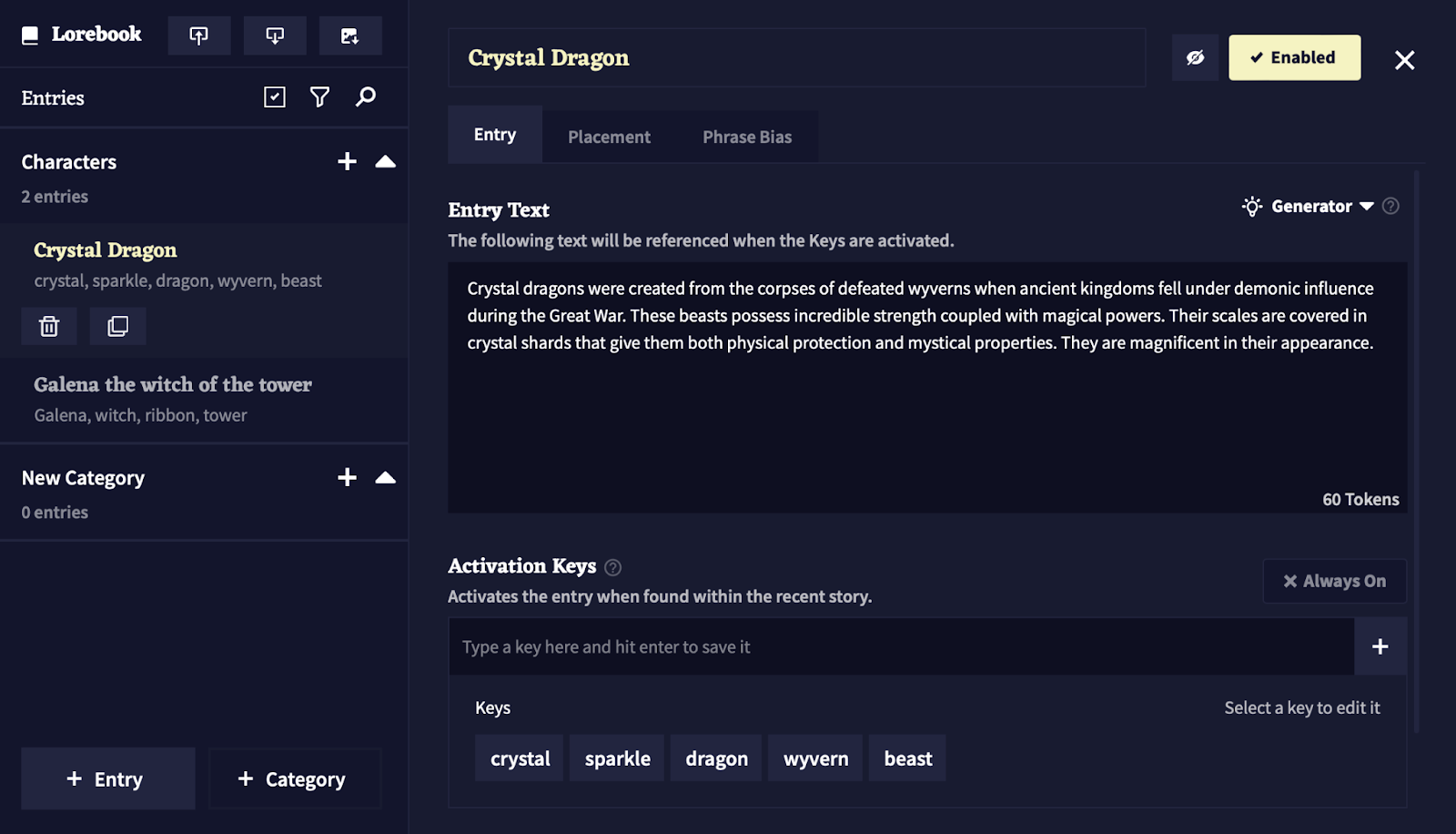
You can use the built-in Generator to let AI fill the entry text, depending on the type of character, place, concept, or entity you want to include. To start, we’ll enter a few lines about the story included in NovelAI’s tutorial, “Crystal Dragon Encounter” using Kayra as our AI Model, no AI Module, and a Carefree preset:
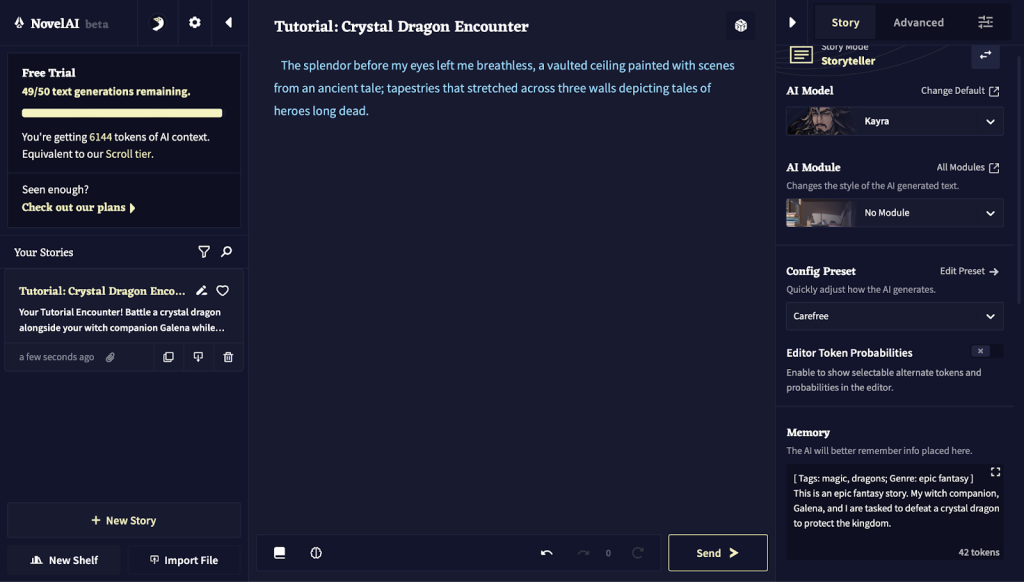
Select Send to let the AI generate the following lines:
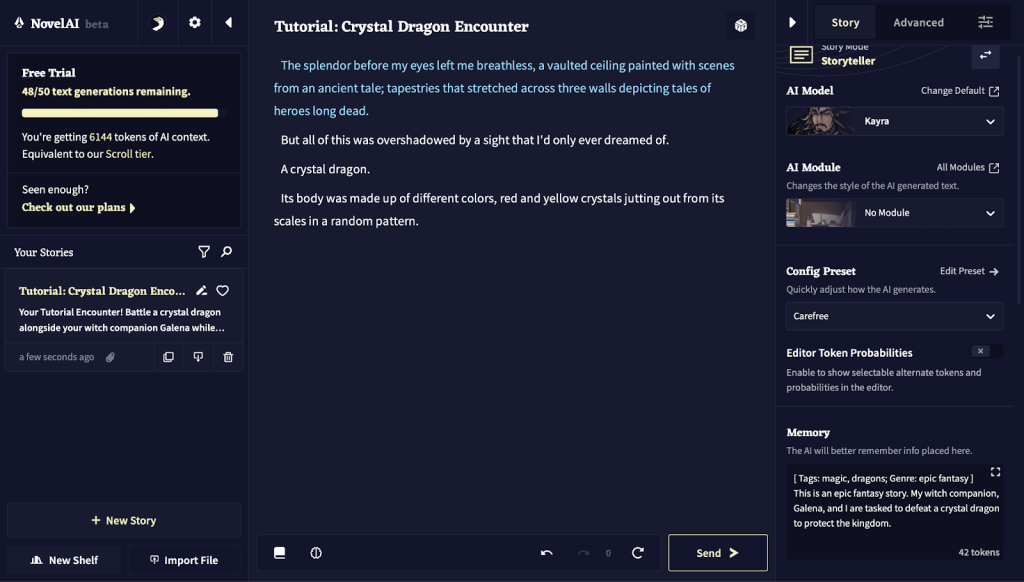
You can see your text generations on the left dashboard; free users will only have 50 generations. Once used, you must purchase one of NovelAI’s subscription plans to continue writing.
NovelAI’s Storyteller Mode is a robust story-writing tool that helped us create a few lines from our sample text. It’s a highly customizable tool; however, new users might be overwhelmed by its features, especially if they don’t have prior experience trying similar AI story-writing platforms.
Text-to-Speech
NovelAI’s Text-to-Speech tool is a new feature that works similarly to other TTS features. It uses two primary sources: Streamed TTS (higher quality, only available for premium users) and Local TTS (uses your browser’s available TTS capabilities). To set it up, go to the dashboard and select Text-to-Speech:
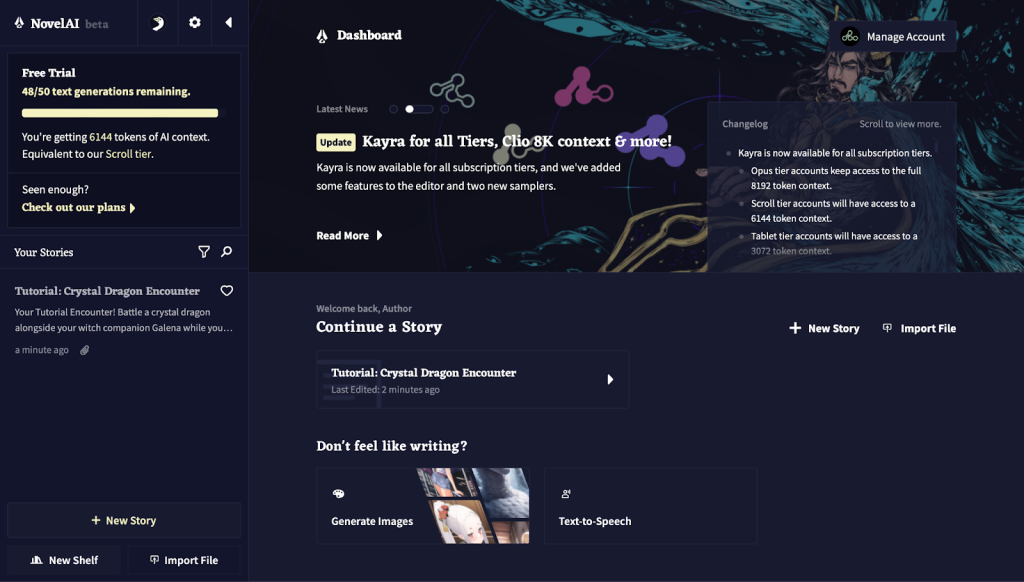
In the settings window, you can change the default Local TTS Settings, like the AI voice, volume, speed, and pitch:
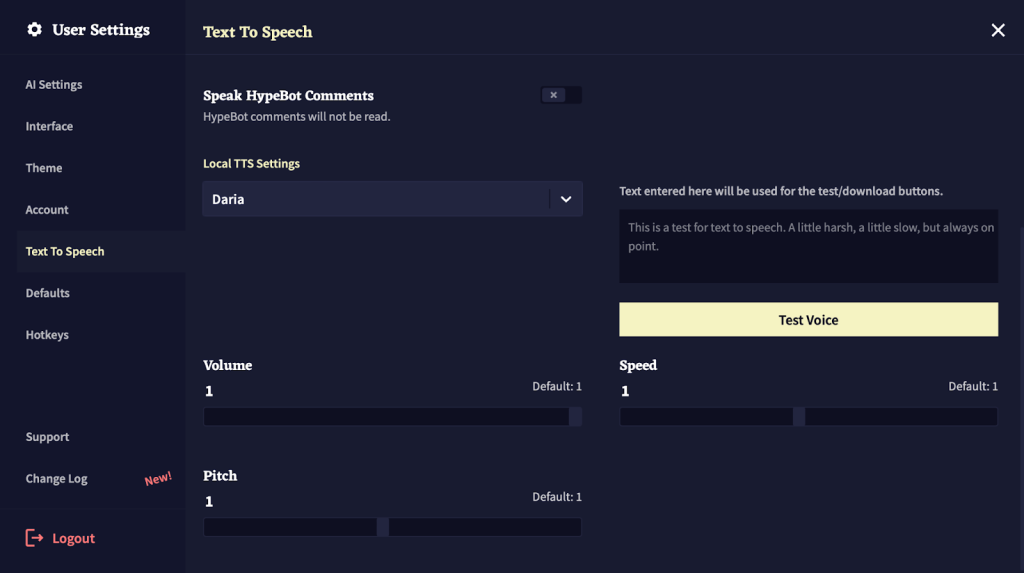
You can use this feature to make the AI read lines in your story. To do this, go back to Storytelling mode and choose the lines you want the TTS to read. Then, right-click and select Speak With TTS:
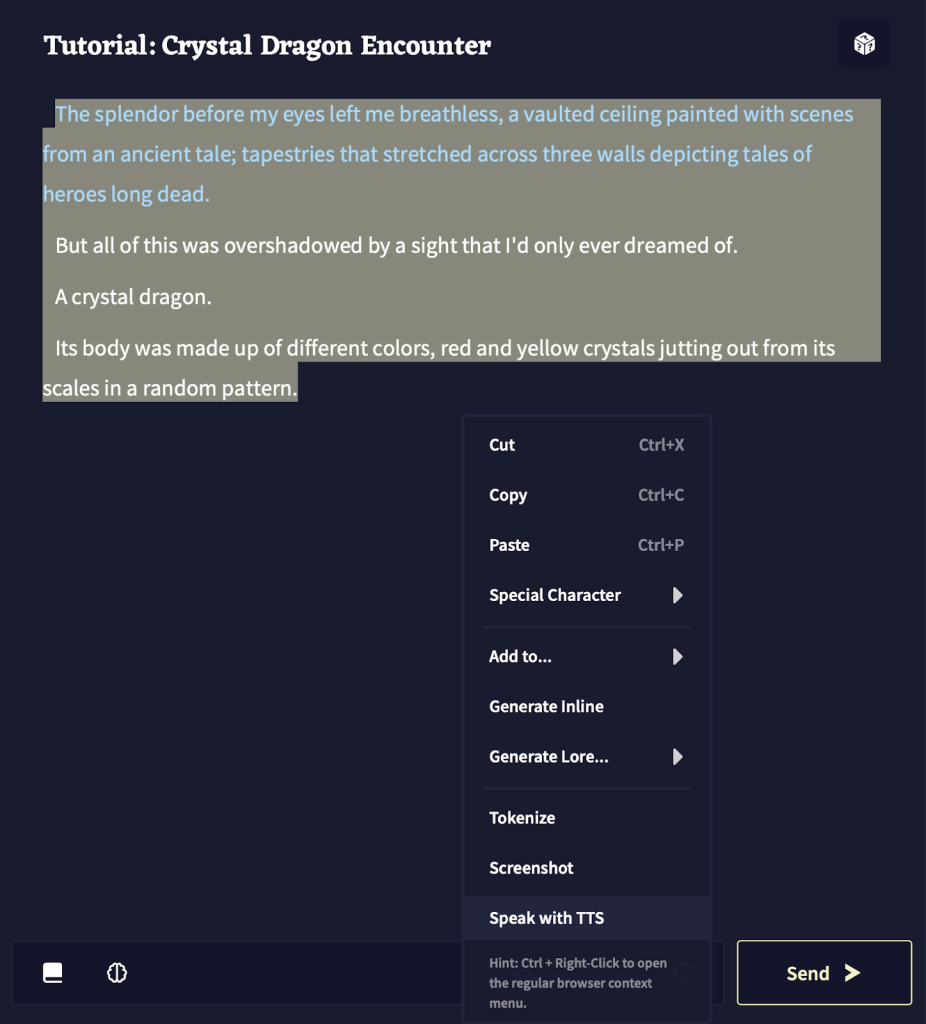
Free users can have up to 100 TTS generations.
We found the platform’s Text-to-Speech feature user-friendly. Users can customize the AI voice’s volume, speed, and pitch. However, its Local TTS source setting produces low-quality audio content—a huge downside for freemium users.
Pricing
NovelAI offers four main pricing plans, each with an increased number of features, text generations, Tokens of Memory (estimates the amount of information the AI can remember), and Anlas credits for custom AI module training and image generation:
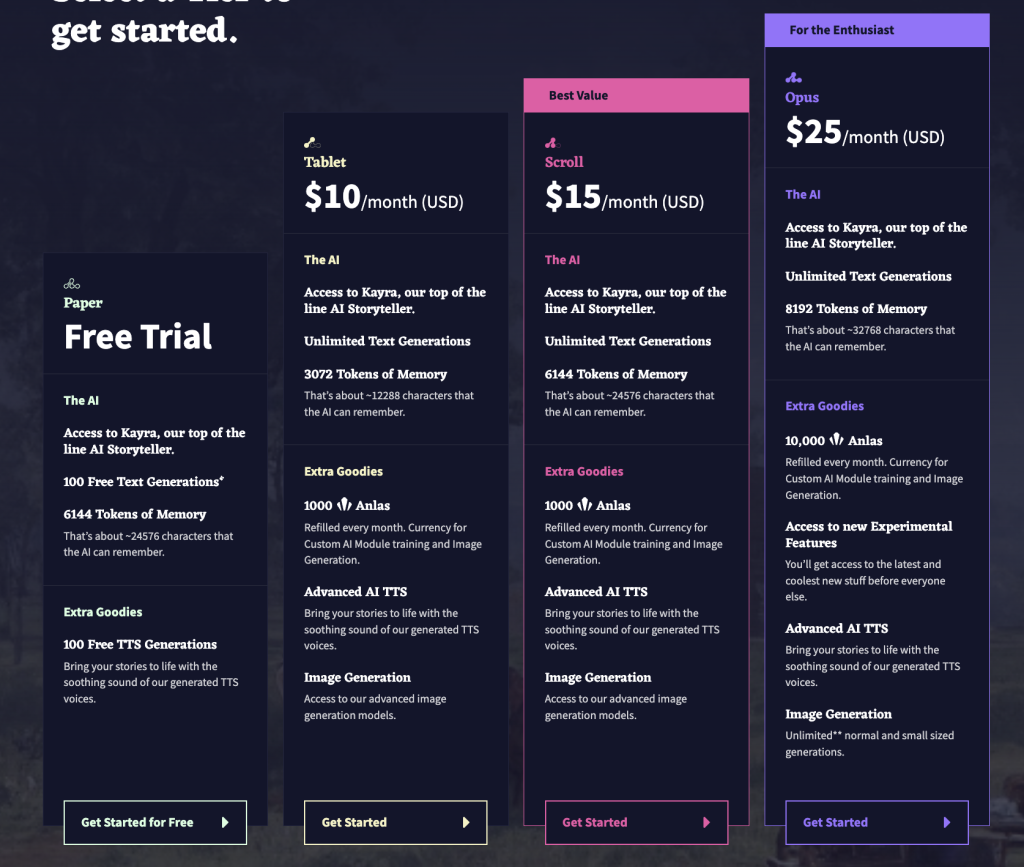
Paper
The Paper plan offers NovelAI’s basic features, which include access to powerful AI models like Kayra, Clio, Genji, and other legacy models. It also has 100 free text generations, up to 6144 Tokens of Memory, and 100 free TTS generations.
Tablet
The Tablet plan is for independent fiction writers and novel authors making short stories. It costs $10 per month and has access to all pre-trained AI models and modules. It includes unlimited text generations, up to 3072 Tokens of Memory, 1000 Anlas credits, access to advanced AI TTS voices, and the Image Generation tool.
Scroll
The Scroll plan is for novel authors and teams to create fictional content with different chapters. It starts at $15 per month and features everything from the Tablet plan, including 6144 Tokens of Memory.
Opus
The Opus plan is for e-book creators and publishers who focus on creating significant amounts of fictional content. It costs $25 per month and features everything from the Scroll plan plus 8192 Tokens of Memory, 10,000 Anlas credits, and access to new experimental features in NovelAI.
Check here to know more about NovelAI’s pricing tiers.
Final Thoughts on NovelAI
NovelAI is a powerful story-writing tool with robust and highly customizable AI models. We liked its ability to remember characters, places, and events in a story using the Lorebook feature. Users can also choose from three main AI models and modules, which greatly help generate unique stories.
We gave the tool a 4.2/5 overall rating due to its powerful AI models and Storytelling Mode. However, new users can have issues figuring out the platform’s interface, especially if they haven’t tried similar platforms to NovelAI. It also has a limited freemium version and low-quality audio on its Text-to-Speech tool.
We recommend it for novel authors and writers with a significant focus on creating fictional content.
Frequently Asked Questions
Share This Post
Ada Rivers
Ada Rivers is a senior writer and marketer with a Master’s in Global Marketing. She enjoys helping businesses reach their audience. In her free time, she likes hiking, cooking, and practicing yoga.
Allow cookies
This website uses cookies to enhance the user experience and for essential analytics purposes. By continuing to use the site, you agree to our use of cookies.



![Dezgo: What is It and a Detailed Review [2025]](https://cdn.sanity.io/images/isy356iq/production/f3af70c9850eaf345bcd9c58c1097f19321a27f8-1200x800.jpg?h=200)
![Pictory: What is It and a Detailed Review [2025]](https://cdn.sanity.io/images/isy356iq/production/3154fe092197e3c8a83bbea0e7740fa136651619-1200x800.jpg?h=200)
![GPTGO: What is It and a Detailed Review [2025]](https://cdn.sanity.io/images/isy356iq/production/7a4c0e4795b6628d74799f75c9bad7ecd858db55-1200x800.jpg?h=200)
![Wordtune: What is It and a Detailed Review [2023]](https://cdn.sanity.io/images/isy356iq/production/eab0cd6cf9ef3b7e9fee29d61d70c2da11ed7bea-1200x800.png?h=200)
![ChatFAI: What Is It And A Detailed Review [2023]](https://cdn.sanity.io/images/isy356iq/production/8c677a676d5e02fbaf48aeb5d85f993a73c78e10-1200x800.png?h=200)